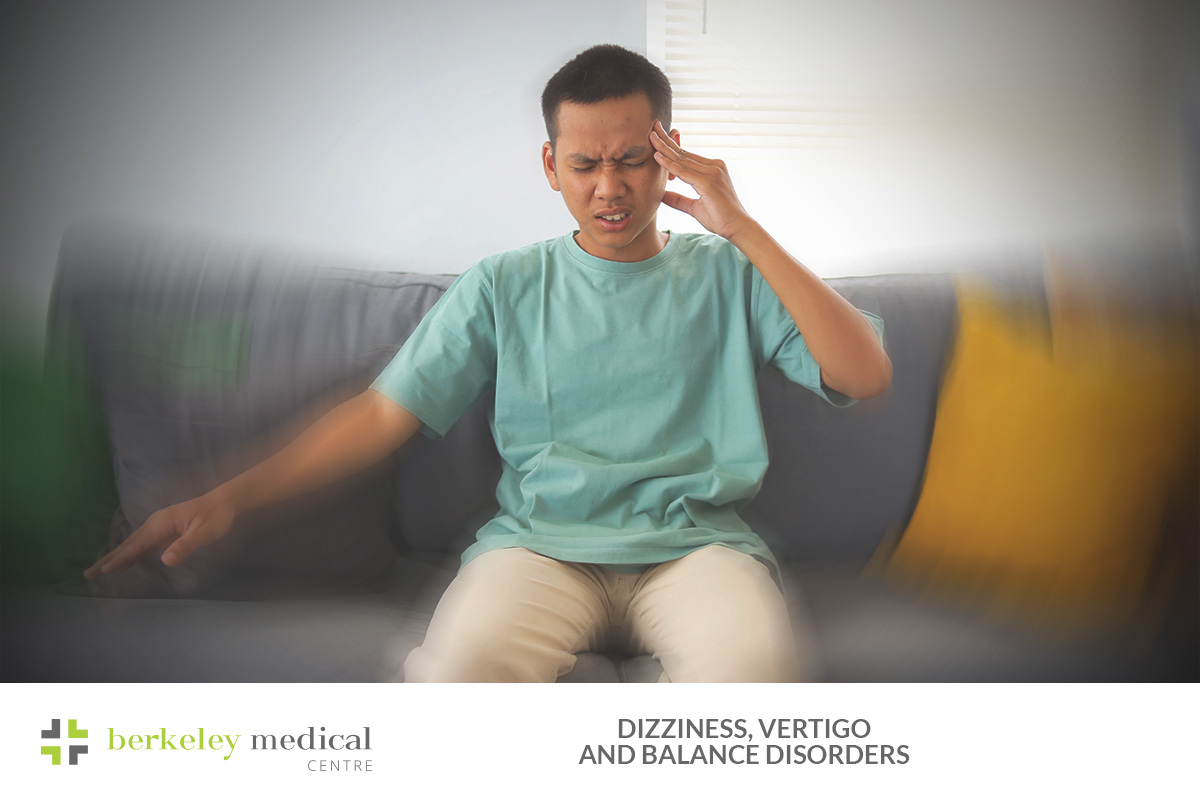Feeling dizzy, off-balance or like the room is spinning? These symptoms can be unsettling and for many people, they interfere with daily life. Dizziness, vertigo and balance disorders are common but often misunderstood conditions. While these sensations can be caused by a range of issues, many are treatable especially when diagnosed early.
This article explores the causes, symptoms and treatment options for dizziness and vertigo. Whether you experience occasional light-headedness or ongoing balance problems, understanding what is going on in your body is the first step to getting help.
Understanding Dizziness and Vertigo
Dizziness refers to a range of sensations, including feeling faint, light-headed, unsteady, or weak. Vertigo, however, is a specific type of dizziness. It gives the illusion that you or your surroundings are spinning, even when you are standing still.
Both can range in intensity and may occur with other symptoms. Often, issues with the inner ear, the brain, or blood circulation can cause these sensations.
Symptoms to Watch For
The symptoms of dizziness and vertigo vary depending on the underlying cause. You may experience:
- A spinning or swaying sensation (vertigo)
- Difficulty walking in a straight line
- Feeling faint or light-headed
- Nausea or vomiting
- Headaches or migraines
- Tinnitus (ringing in the ears)
- Blurred vision or visual disturbances
- Eye movements that feel jerky or erratic
- Difficulty concentrating
- Feeling unstable, especially in crowded or moving environments
These symptoms may come and go, or they may last for minutes, hours, or days. If they persist or worsen, you should speak with your GP.
How the Balance System Works
To maintain balance, your body relies on three interconnected systems:
- Inner ear (vestibular system): Detects head movement and orientation.
- Vision: Helps identify your position relative to your environment.
- Proprioception: Sensors in your muscles and joints provide feedback on body position and movement.
Your brain processes signals from these systems and coordinates a response to keep you steady. If one system is not working properly, the others compensate. However, when more than one system is disrupted or if the brain cannot process the information accurately you may feel dizzy or off-balance.
Common Causes of Dizziness and Vertigo
Most cases of dizziness and vertigo are linked to inner ear issues. However, there are also non-ear-related causes. Let us break them down.
Inner Ear Causes
- Benign Paroxysmal Positional Vertigo (BPPV): Caused by loose calcium crystals in the inner ear canals, BPPV leads to brief, intense episodes of spinning, often triggered by head movement.
- Vestibular Neuritis or Labyrinthitis: Inflammation of the inner ear due to viral infection can cause sudden and severe vertigo, often with nausea and vomiting.
- Meniere’s Disease: A chronic condition involving fluid build-up in the inner ear, causing episodes of vertigo, tinnitus, hearing loss and a feeling of fullness in the ear.
- Vestibular Migraine: A migraine variant that causes vertigo with or without a headache. Symptoms may be triggered by motion, bright lights, or busy visual environments.
Other Common Causes
- Low blood pressure (hypotension)
- Side effects of medication
- Dehydration
- Anxiety and stress
- Neurological conditions like stroke or multiple sclerosis
While these causes differ, many are manageable with the right diagnosis and support.
Diagnosis: What to Expect
To determine the cause of your dizziness or vertigo, your doctor will begin by taking a thorough medical history. They will ask about the frequency, duration and triggers of your symptoms.
They may also perform:
- A physical examination, including checking your balance and eye movements
- Blood pressure testing
- Hearing and vestibular function tests
- CT or MRI scans if a neurological issue is suspected
Accurate diagnosis is key to finding the most effective treatment.
Treatment Options
The best treatment depends on the cause of your symptoms. In some cases, dizziness will resolve on its own as your body adapts or heals. However, ongoing or severe symptoms may need a tailored treatment plan.
Common treatment strategies include:
- Medication to relieve symptoms like nausea or inflammation
- Vestibular rehabilitation therapy (VRT): A physiotherapy-based program to improve balance and reduce dizziness
- Dietary adjustments, such as reducing caffeine or salt intake, especially in cases like Meniere’s disease
- Psychological support to manage anxiety-related dizziness
- Surgery, though rarely needed, may be considered in severe or unresponsive cases
Lifestyle changes, such as staying hydrated and avoiding sudden head movements, can also help reduce symptoms.
When Should You See a Doctor?
While occasional dizziness may not be a cause for concern, it is important to seek medical attention if:
- Your dizziness lasts for more than a few minutes
- You experience it frequently
- You also notice hearing loss, vision changes, or unsteadiness while walking
- Your symptoms interfere with daily activities like work or driving
Getting an early diagnosis can make a significant difference in managing symptoms and improving your quality of life.
Support from Berkeley Medical Centre
At Berkeley Medical Centre, we understand how disruptive dizziness, vertigo and balance issues can be. Our experienced general practitioners take the time to assess your symptoms thoroughly and collaborate with allied health professionals such as physiotherapists and audiologists to create a personalised care plan.
Whether you are managing occasional dizziness or dealing with ongoing balance problems, we are here to help you regain control of your health and confidence in your daily life.
Final Thoughts
Dizziness and balance disorders are not just frustrating they can affect your independence and safety. Thankfully, they are often treatable with the right approach. If you are experiencing these symptoms, do not ignore them. With proper support and care, you can take steps to feel steady, focused and back to your usual self.







